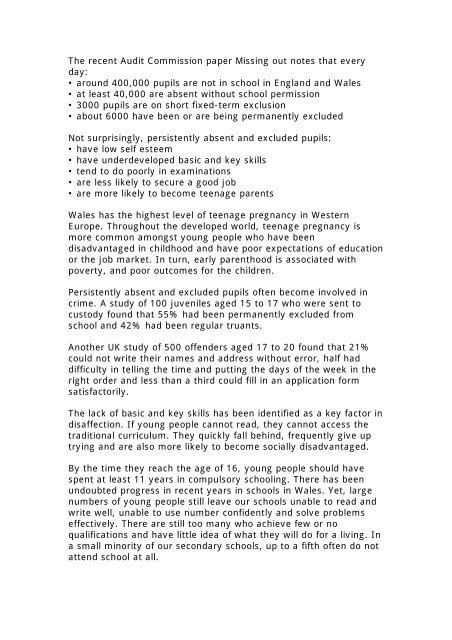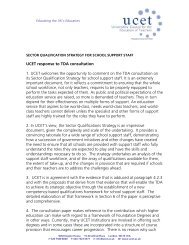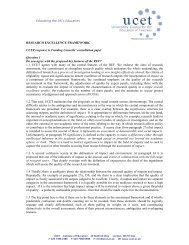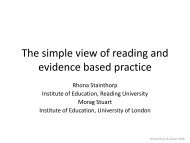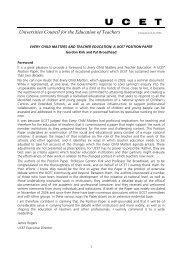The School Curriculum Ten Years Hence - UCET: Universities ...
The School Curriculum Ten Years Hence - UCET: Universities ...
The School Curriculum Ten Years Hence - UCET: Universities ...
Create successful ePaper yourself
Turn your PDF publications into a flip-book with our unique Google optimized e-Paper software.
<strong>The</strong> recent Audit Commission paper Missing out notes that every<br />
day:<br />
• around 400,000 pupils are not in school in England and Wales<br />
• at least 40,000 are absent without school permission<br />
• 3000 pupils are on short fixed-term exclusion<br />
• about 6000 have been or are being permanently excluded<br />
Not surprisingly, persistently absent and excluded pupils:<br />
• have low self esteem<br />
• have underdeveloped basic and key skills<br />
• tend to do poorly in examinations<br />
• are less likely to secure a good job<br />
• are more likely to become teenage parents<br />
Wales has the highest level of teenage pregnancy in Western<br />
Europe. Throughout the developed world, teenage pregnancy is<br />
more common amongst young people who have been<br />
disadvantaged in childhood and have poor expectations of education<br />
or the job market. In turn, early parenthood is associated with<br />
poverty, and poor outcomes for the children.<br />
Persistently absent and excluded pupils often become involved in<br />
crime. A study of 100 juveniles aged 15 to 17 who were sent to<br />
custody found that 55% had been permanently excluded from<br />
school and 42% had been regular truants.<br />
Another UK study of 500 offenders aged 17 to 20 found that 21%<br />
could not write their names and address without error, half had<br />
difficulty in telling the time and putting the days of the week in the<br />
right order and less than a third could fill in an application form<br />
satisfactorily.<br />
<strong>The</strong> lack of basic and key skills has been identified as a key factor in<br />
disaffection. If young people cannot read, they cannot access the<br />
traditional curriculum. <strong>The</strong>y quickly fall behind, frequently give up<br />
trying and are also more likely to become socially disadvantaged.<br />
By the time they reach the age of 16, young people should have<br />
spent at least 11 years in compulsory schooling. <strong>The</strong>re has been<br />
undoubted progress in recent years in schools in Wales. Yet, large<br />
numbers of young people still leave our schools unable to read and<br />
write well, unable to use number confidently and solve problems<br />
effectively. <strong>The</strong>re are still too many who achieve few or no<br />
qualifications and have little idea of what they will do for a living. In<br />
a small minority of our secondary schools, up to a fifth often do not<br />
attend school at all.


